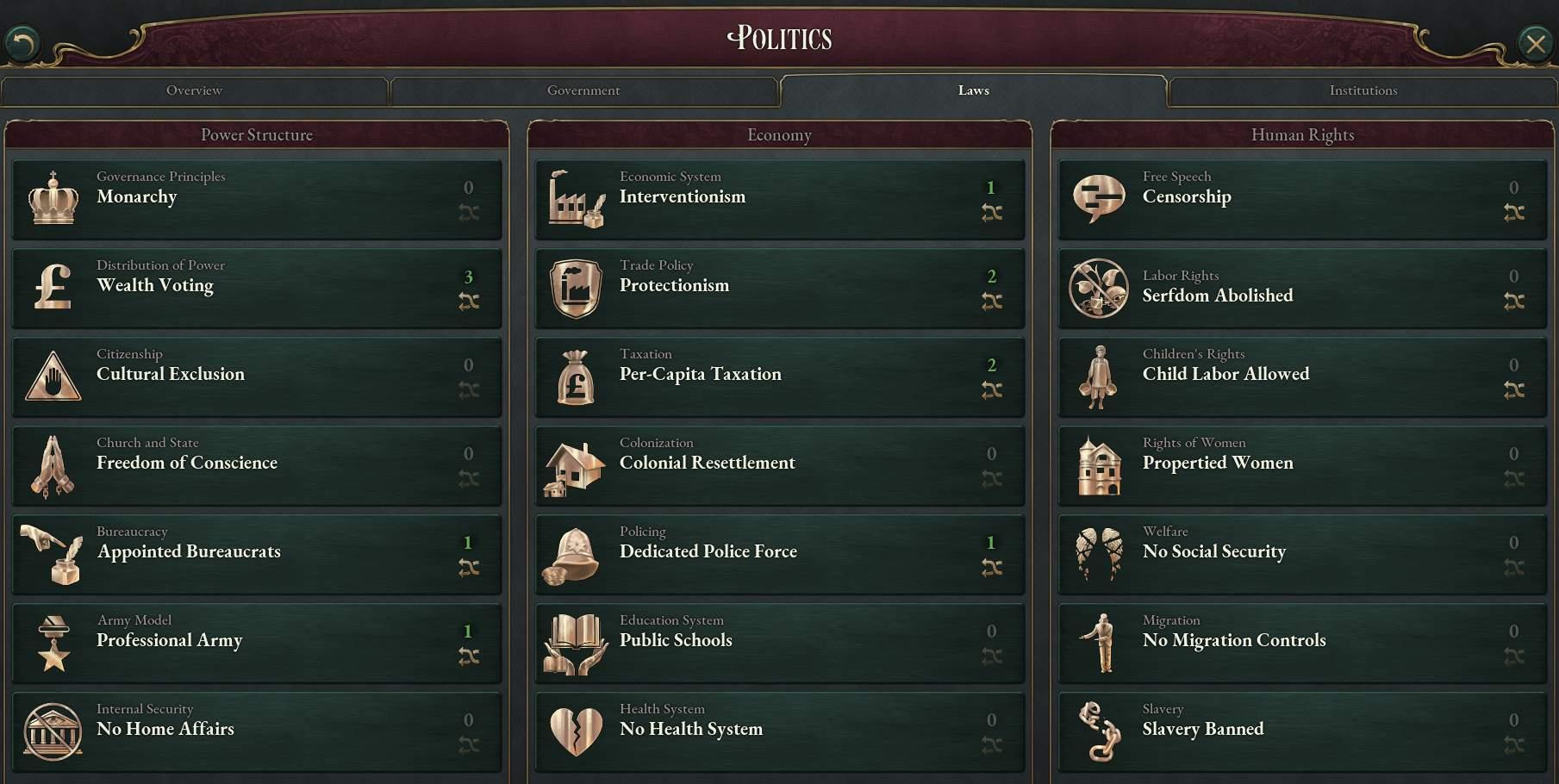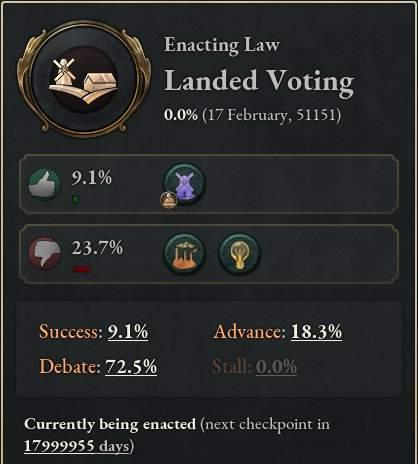
Laws represent legal reforms in the country creating different political, economic, and social conditions for its pops, which over time changes the fabric of its society. This change can be slow and incremental, or fast and revolutionary.
Laws Guide
Intro
At the start of the game all countries are set up with the best fitting laws compared to what they actually had in 1836. This varies wildly between countries, and greatly influences what sorts of conditions and strategies are available to the player while playing them.
By connecting different effects to starting laws, many historically appropriate and recognizable aspects and behaviors of Victorian-era nations are connected to a tangible property to encourage history develop in a more familiar direction.
That being said, these starting laws are far from set in stone and can be reformed by the player to better suit the direction their society is going.
Change Reasons
Laws affect pops who live in the country currently, but will also limit which pops might migrate there few pops would make it their preference to move to a country where they’re mistreated by law.
A common effect of laws is to modify some parameter about the country and even alter the effects of other parts of your society. Additionally, they can also permit or disallow the use of certain actions.
Another reason to change laws is because the people have demanded it. Laws influence how much political strength pops provide to interest groups. As a result, different groups of pops approve more or less of the society the player has built depending on their economic well-being, and their demands for change is more or less intimidating depending on how many and how strong they are.
The player may choose to placate an angry group, or further benefit an already content group for extra benefits. But in doing so, some other group will become displeased. Reforming existing laws to work more in accordance with the powerful interest groups’ ideologies is a quick way to win their approval, permitting more leeway to go against their wishes in the future or as a quick pick-me-up in case their standard of living has recently taken a hit. Of course, the inverse is also true, and laws can be used to purposely anger and reduce the power of interest groups.

The numbers in green refer to the number of alternative laws currently available to be enacted in that sub-category.
Enacting Laws

At the checkpoint date one of the 4 options (success, debate, advance, stall) will happen.
Enacting a law is not an instantaneous, one-click affair.
Any reform must be supported by at least one interest group in the government who can champion the change. Interest groups have ideologies and an approval score that lead them to favor certain laws over others. While broader coalitions of interest groups in government give more options of laws to enact, it also complicates getting them passed.
Once a reform has begun it can be a smooth process that’s over in a matter of months, or it can take years of grueling debate and stalling tactics in parliament, causing them to take more effort than they’re worth. While the default time to pass a law is 180 days, the actual amount of time it takes depends both on the government’s legitimacy in the eyes of the people, and also on the clout of the interest groups in the government that support and oppose the new law relative to the one it’s replacing.
Law Categories
There are three major categories of laws with seven sub-categories in each, which themselves contain up to half a dozen specific law options.
Although laws are almost always completely independent from one another, in some sub-categories, it is not possible to move directly from one extreme to the other. The player will have to make gradual changes, first picking the intermediate laws before getting to the other extreme.
Power structure laws
- Army Model – How your army is organized and regulated.
- Bureaucracy – How your country is administered.
- Church and State – The relationship between physical and spiritual governors.
- Citizenship – Extending the rights of citizenship.
- Governance Principles – The foundational principles and authority by which your country is governed. Determines who the Head of State is.
- Distribution of Power – How political power is distributed. Determines who the Head of State is accountable to.
- Internal Security – Keeping your own affairs in order.
Economy laws
- Colonization – Your stance on establishing colonies to supplant and conquer decentralized nations.
- Economic System – The fundamental principles of your economy.
- Education System – For when the children are done with chimney sweeping chores.
- Health System – Laws about the government’s involvement (or lack thereof) in providing healthcare for its citizens.
- Policing – The priorities of the national police force.
- Taxation – How the state raises revenue by taxing its citizens.
- Trade Policy – Laws governing trade and the exchange of goods across borders.
Human rights laws
- Children’s Rights – The rights and protections afforded to children.
- Free Speech – Laws regulating free speech and right to public assembly.
- Labor Rights – The rights of workers.
- Migration – Controlling the flow of people.
- Rights of Women – The legal regulations of the fairer sex.
- Slavery – People as property.
- Welfare – Government assistance for the income deprived.





Be the first to comment